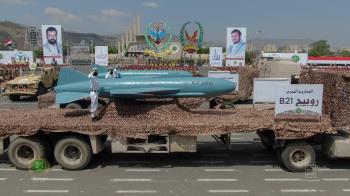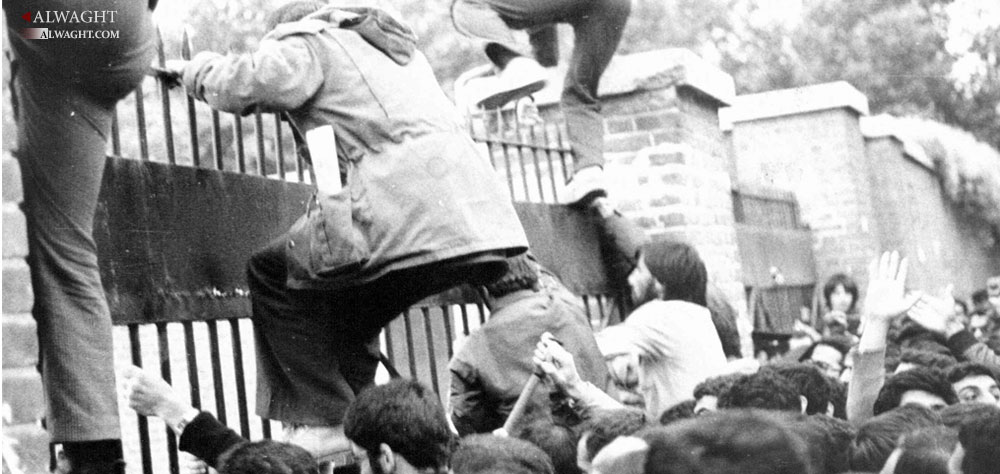Alwaght-On November 4th every year, Iranians mark the historical takeover of the United States embassy in Iran months after the victory of the Islamic Revolution.
On November 4, 1979, a group of revolutionary Iranian university students took over the US Embassy which had turned into a den of espionage whose ultimate objective was to overthrow the Islamic Republic establishment. Ten days later, former US President Jimmy Carter issued an executive order, freezing all assets and properties of the Iranian government, organizations and companies in the US in response to the hostage taking.
During the incident, the Iranian revolutionary students detained 52 American spies disguised as diplomats for 444 days.
Shredded documents found at the compound later validated the assertion by revolutionary students that the US embassy in Tehran was indeed the nerve center of a plot to overthrow the new Islamic establishment of Iran.
The late founder of the Islamic Republic, Imam Khomeini, later hailed the action by students as 'a second revolution' which had a far much greater significance.
One of the lasting legacies of the takeover was the spread of the 'Death to America' slogan as a symbol of nations resisting and confronting US-led imperialism worldwide and especially the West Asia region. The current heroic resistance of Yemenis is an outstanding example of a nation which is resisting US imperialism.
Revolutionary Iran an Inspiration
The Islamic Revolution in Iran strengthened the weakening nationalism in regional countries. The Islamic revolution intensified the awakening of the masses which had started to gain momentum in the region. All over the Arab world there was immense admiration for the Islamic revolution among the masses. Many people were inspired by the Islamic Revolution, whose leader, Imam Khomeini, emphasized that Islam is the only way to liberate the region from hardships and dictatorships propped up by the western powers. Arab masses despised the weakness of their own leaders and reviled their subordination to the US.
Iran has become an inspiration and role model for other regional nations and movements in the struggle against imperialism and arrogant powers. Disenfranchised masses in the region look upon the Islamic Republic of Iran and its leadership for guidance in the formation of resistance movements.
Embassies as Espionage Centers
The takeover of the US Embassy in Tehran had ramifications beyond Iran with heated debates on how diplomatic mission, especially those representing Western countries, have moved beyond their stated mandate of strengthening mutual ties to espionage.
Documents available at the whistleblowing website WikiLeaks have indeed vindicated Iranian students who uncovered massive documents which showed how the US embassy in Tehran turned into a den of spies conspiring to overthrow the nascent Islamic Republic of Iran. The US never learnt its lessons from the Tehran fiasco but continued to use its embassies globally not only to spy on foes but also on allies and even the United Nations.
WikiLeaks revealed a classified directive issued to US diplomats under Hillary Clinton's name in July 2009, demanding forensic technical details about the communications systems used by top UN officials, including passwords and personal encryption keys used in private and commercial networks for official communications.
Iran's Revolution Pioneered Resisting US Imperialism
Before the 1979 Islamic Revolution, no other revolution had stood firmly and resisted the US like the revolutionary Iranian nation. Indeed, the Islamic Revolution in Iran pioneered and set a precedent for others resisting bullying powers and especially the US.
The Islamic Revolution in Iran is also an outstanding example on how people's revolution can be protected and maintained by utterly rejecting foreign interference bent on wrecking or distorting the revolution.
Iran's Islamic Revolution also provided a roadmap on how pockets of spontaneous struggle by masses can snowball into a major resistance movement.
The gallant revolutionary nation in Iran sent a message to the Western nations that the masses in the West Asia region despise and hate Western governments particularly the US and that they are ready to resist these arrogant and imperialist powers.
Therefore, the US Embassy (Den of Spies) takeover, aptly dubbed a second revolution, actually debunked the myth of American might as well as its self-conceit and the way it projected itself as a global power.
After the historical incident in Tehran, there emerged, in different proportions, unprecedented stances and moves against US arrogance.
Therefore, after the fall of Iran's US-backed dictator, Mohammad Reza Pahlavi, many movements in the West Asia region emerged to overthrow US satellite regimes. The 'Den of Spies' takeover was the final act in the full victory of the Islamic Revolution and since then, the Iranian nation continues to be an inspiration for resistance against US interventionist and imperialist policies across the world.



























